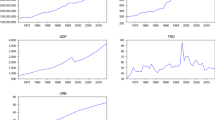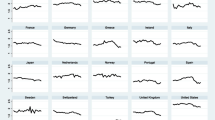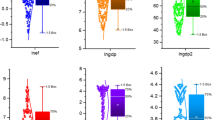Abstract
There is a growing demand for energy to support economic and social development. There will be many shifts in the energy sector as a result of digitization. Hence, we aim analyzing the linkage between digitalization and environment sustainability by incorporating energy consumption as a moderating factor using data of UK from 1990 to 2020. Different dimensions of digitalization are used as explanatory variables, ecological and carbon footprints are used as outcomes and energy consumption is used as moderator. The findings of autoregressive distributed lag model show that internet users and technological advancement (fixed telephone subscription and mobile cellular) are negatively (positively) linked with ecological and carbon footprints. Energy consumption causes to enhance ecological and carbon footprints and plays an antagonistic role in the nexus of internet users, technological advancement, and ecological and carbon footprints. The effects of mobile cellular and fixed telephone subscription have increased in the presence of energy consumption as moderator which exhibits that energy consumption plays an enhancing role in the links between mobile cellular, fixed telephone subscription and ecological and carbon footprints. The results underscore the importance of taking a holistic approach to addressing the environmental impact of digital technologies. By promoting sustainable communication practices and investing in the development of more energy-efficient technologies, practitioners, managers, and society as a whole can work together to reduce the carbon and ecological footprints of digital technologies and create a more sustainable future for all.

Similar content being viewed by others
Data availability
The data presented in this study are available on request from the corresponding author.
References
Adha R, Hong CY, Agrawal S, Li LH (2021) ICT, carbon emissions, climate change, and energy demand nexus: the potential benefit of digitalization in Taiwan. Energy & Environment. https://doi.org/10.1177/0958305X221093458
Ahmed F, Kousar S, Pervaiz A, Ramos-Requena JP (2020) Financial development, institutional quality, and environmental degradation nexus: new evidence from asymmetric ARDL co-integration approach. Sustainability 12(18):7812
Aibai A, Huang X, Luo Y, Peng Y (2019) Foreign direct investment, institutional quality, and financial development along the belt and road: an empirical investigation. Emerg Mark Financ Trade 55(14):3275–3294
Aksin-Sivrikaya S, Bhattacharya CB (2017) Where digitalization meets sustainability: opportunities and challenges. Sustainability in a digital world. pp 37–49
Al-Mulali U, Sheau-Ting L, Ozturk I (2015) The global move toward Internet shopping and its influence on pollution: an empirical analysis. Environ Sci Pollut Res 22(13):9717–9727
Anochiwa LI, Agbanike TF, Chukwu AB, Ikpe M, Otta NN (2022) Urbanization and carbon emissions: looking at the role of mobile phone adoption in Sub-Saharan African countries. Environ Sci Pollut Res 29(52):78526–78541
Appiah-Otoo I, Acheampong AO, Song N, Chen X (2022) The impact of information and communication technology (ICT) on carbon dioxide emissions: evidence from heterogeneous ICT countries. Energy & Environment. https://doi.org/10.1177/0958305X221118877
Avom D, Nkengfack H, Fotio HK, Totouom A (2020) ICT and environmental quality in Sub-Saharan Africa: effects and transmission channels. Technol Forecast Soc Chang 155:120028
Balogun AL, Marks D, Sharma R, Shekhar H, Balmes C, Maheng D, Arshad A, Salehi P (2020) Assessing the potentials of digitalization as a tool for climate change adaptation and sustainable development in urban centres. Sustain Cities Soc 53:101888
Bansal P, Song HC (2017) Similar but not the same: differentiating corporate sustainability from corporate responsibility. Acad Manag Ann 11(1):105–149
Brenner B, Hartl B (2021) The perceived relationship between digitalization and ecological, economic, and social sustainability. J Clean Prod 315:128128
Chatti W (2021) Moving towards environmental sustainability: information and communication technology (ICT), freight transport, and CO2 emissions. Heliyon 7(10):e08190
Chu LK (2022) Determinants of ecological footprint in OCED countries: do environmental-related technologies reduce environmental degradation? Environ Sci Pollut Res 29(16):23779–23793
Dougherty D, Dunne DD (2012) Digital science and knowledge boundaries in complex innovation. Organ Sci 23(5):1467–1484
Erdoğdu H, Çiçek H (2017) Modelling beef consumption in Turkey: the ARDL/bounds test approach. Turkish J Vet Anim Sci 41(2):255–264
Fehske A, Fettweis G, Malmodin J, Biczok G (2011) The global footprint of mobile communications: the ecological and economic perspective. IEEE Commun Mag 49(8):55–62
Feroz AK, Zo H, Chiravuri A (2021) Digital transformation and environmental sustainability: a review and research agenda. Sustainability 13(3):1530
Fritzsche K, Niehoff S, Beier G (2018) Industry 4.0 and climate change—exploring the science-policy gap. Sustainability 10(12):4511
Gupta S, Motlagh M, Rhyner J (2020) The digitalization sustainability matrix: a participatory research tool for investigating digitainability. Sustainability 12(21):9283
Haini H (2021) Examining the impact of ICT, human capital and carbon emissions: evidence from the ASEAN economies. Int Econ 166:116–125
Hsu CC, Tsaih RH, Yen DC (2018) The evolving role of IT departments in digital transformation. Sustainability 10(10):3706
Huang Y, Haseeb M, Usman M, Ozturk I (2022) Dynamic association between ICT, renewable energy, economic complexity and ecological footprint: is there any difference between E-7 (developing) and G-7 (developed) countries? Technol Soc 68:101853
Huo W, Ullah MR, Zulfiqar M, Parveen S, Kibria U (2022) Financial development, trade openness, and foreign direct investment: a battle between the measures of environmental sustainability. Frontiers in Environmental Science 10:851290. https://doi.org/10.3389/fenvs.2022.851290
Husaini DH, Lean HH (2022) Digitalization and energy sustainability in ASEAN. Resour Conserv Recycl 184:106377
Kartal MT (2023) Production-based disaggregated analysis of energy consumption and CO2 emission nexus: evidence from the USA by novel dynamic ARDL simulation approach. Environ Sci Pollut Res 30(3):6864–6874
Kauffman RJ, Li T, Van Heck E (2010) Business network-based value creation in electronic commerce. Int J Electron Commer 15(1):113–144
Ke J, Jahanger A, Yang B, Usman M, Ren F (2022) Digitalization, financial development, trade, and carbon emissions; implication of pollution haven hypothesis during globalization mode. Frontiers in Environmental Science 10:873880. https://doi.org/10.3389/fenvs.2022.873880
Khan H, Weili L, Khan I (2022) Examining the effect of information and communication technology, innovations, and renewable energy consumption on CO2 emission: evidence from BRICS countries. Environ Sci Pollut Res 29(31):47696–47712
Kwakwa PA, Adzawla W, Alhassan H, Oteng-Abayie EF (2023) The effects of urbanization, ICT, fertilizer usage, and foreign direct investment on carbon dioxide emissions in Ghana. Environ Sci Pollut Res 30(9):23982–23996
Lakhani KR, Iansiti M, Herman K (2014) GE and the industrial internet. Harvard Business School, Boston
Li L, Su F, Zhang W, Mao JY (2018) Digital transformation by SME entrepreneurs: A capability perspective. Information Systems Journal 28(6):1129–1157
Li Z, Li N, Wen H (2021) Digital economy and environmental quality: evidence from 217 cities in China. Sustainability 13(14):8058
Lichtenthaler U (2020) Building blocks of successful digital transformation: complementing technology and market issues. Int J Innov Technol Manag 17(01):2050004
Lichtenthaler U (2021) Digitainability: the combined effects of the megatrends digitalization and sustainability. J Innov Manag 9(2):64–80
Magazzino C, Porrini D, Fusco G, Schneider N (2021) Investigating the link among ICT, electricity consumption, air pollution, and economic growth in EU countries. Energy Sources Part B 16(11–12):976–998
Mani V, Agarwal R, Gunasekaran A, Papadopoulos T, Dubey R, Childe SJ (2016) Social sustainability in the supply chain: construct development and measurement validation. Ecol Ind 71:270–279
Nasiri M, Rantala T, Saunila M, Ukko J, Rantanen H (2018) Transition towards sustainable solutions: product, service, technology, and business model. Sustainability 10(2):358
Ozgur O, Yilanci V, Kongkuah M (2022) Nuclear energy consumption and CO2 emissions in India: evidence from Fourier ARDL bounds test approach. Nucl Eng Technol 54(5):1657–1663
Özpolat A (2022) How does internet use affect ecological footprint?: An empirical analysis for G7 countries. Environ Dev Sustain 24(11):12833–12849
Pesaran MH, Shin Y, Smith RJ (2001) Bounds testing approaches to the analysis of level relationships. J Appl Economet 16(3):289–326
Phillips PP, Perron, (1988) Testing for a unit root in time series analysis. Biometrika 75:335–346
Rego A, Polónia D (2017) Corporate sustainability: a view from the top. J Bus Ethics 143(1):133–157
Ren S, Hao Y, Xu L, Wu H, Ba N (2021) Digitalization and energy: how does internet development affect China’s energy consumption? Energy Economics 98:105220
Salahuddin M, Gow J (2016) The effects of Internet usage, financial development and trade openness on economic growth in South Africa: a time series analysis. Telematics Inform 33(4):1141–1154
Salminen V, Ruohomaa H, Kantola J (2017) Digitalization and big data supporting responsible business co-evolution. In Advances in human factors, business management, training and education. Springer, Cham, pp 1055–1067
Saunila M, Rantala T, Ukko J, Havukainen J (2019) Why invest in green technologies? Sustainability engagement among small businesses. Technol Anal Strateg Manag 31(6):653–666
Solarin SA, Al-Mulali U, Musah I, Ozturk I (2017) Investigating the pollution haven hypothesis in Ghana: an empirical investigation. Energy 124:706–719
Strand R (2014) Strategic leadership of corporate sustainability. J Bus Ethics 123(4):687–706
Weili L, Khan H, Khan I, Han L (2022) The impact of information and communication technology, financial development, and energy consumption on carbon dioxide emission: evidence from the Belt and Road countries. Environ Sci Pollut Res 29:27703–27718
Xu L, Wang X, Wang L, Zhang D (2022) Does technological advancement impede ecological footprint level? The role of natural resources prices volatility, foreign direct investment and renewable energy in China. Resour Policy 76:102559
Xue Y, Tang C, Wu H, Liu J, Hao Y (2022) The emerging driving force of energy consumption in China: does digital economy development matter? Energy Policy 165:112997
Author information
Authors and Affiliations
Contributions
Conceptualization, done by M.Z and M.R.U; methodology, formed by S.H.T and M.Z.; software and validation, performed by S.H.T and M.R.U; formal analysis did by M.R.U; investigation, resources, data curation, performed S.G and M.Z; writing—original draft preparation done by M.R.U and S.G; writing—review and editing by M.Z and S.H.T; visualization, and supervision by M.R.U and S.G.
Corresponding author
Ethics declarations
Ethics approval
This article does not include any studies with human and animal participants performed by any of the authors.
Consent to participants
This article does not contain any studies with human participants performed by any of the authors.
Consent to publish
Not applicable.
Conflict of interest
The authors declare no competing interests.
Additional information
Responsible Editor: Philippe Garrigues
Publisher's note
Springer Nature remains neutral with regard to jurisdictional claims in published maps and institutional affiliations.
Rights and permissions
Springer Nature or its licensor (e.g. a society or other partner) holds exclusive rights to this article under a publishing agreement with the author(s) or other rightsholder(s); author self-archiving of the accepted manuscript version of this article is solely governed by the terms of such publishing agreement and applicable law.
About this article
Cite this article
Zulfiqar, M., Tahir, S.H., Ullah, M.R. et al. Digitalized world and carbon footprints: does digitalization really matter for sustainable environment?. Environ Sci Pollut Res 30, 88789–88802 (2023). https://doi.org/10.1007/s11356-023-28332-z
Received:
Accepted:
Published:
Issue Date:
DOI: https://doi.org/10.1007/s11356-023-28332-z




